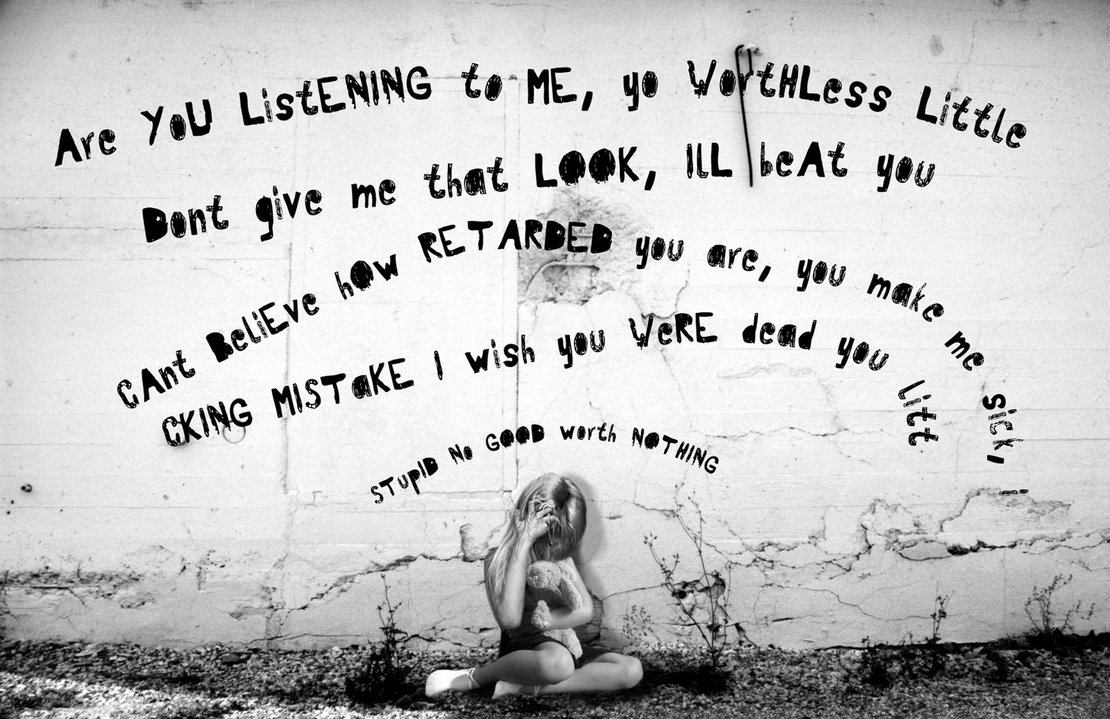Being a victim of child abuse myself, I know the feeling. It still haunts me to this very day and affects my life in some ways even after I have outgrown it and have actually become a more positive person
Ignoring children’s needs like I see a neighbor of mine doing, putting them in unsupervised, dangerous situations, or making a child feel worthless or stupid are also considered child abuse. Regardless of the type of child abuse, the result is serious emotional harm.
All types of child abuse and neglect leave lasting scars. Some of these scars might be physical, but emotional scarring has long lasting effects throughout life, damaging a child’s sense of self, ability to have healthy relationships, and ability to function at home, at work and at school. Some effects include:
- Lack of trust and relationship difficulties. If you can’t trust your parents, who can you trust? And believe me, personally, up until today I do have trust issues all around. Abuse by a primary caregiver damages the most fundamental relationship as a child—that you will safely, reliably get your physical and emotional needs met by the person who is responsible for your care. Without this base, it is very difficult to learn to trust people or know who is trustworthy. This can lead to difficulty maintaining relationships due to fear of being controlled or abused. It can also lead to unhealthy relationships because the adult doesn’t know what a good relationship is.
- Core feelings of being “worthless” or “damaged.” If you’ve been told over and over again as a child that you are stupid or no good, it is very difficult to overcome these core feelings. You may experience them as reality. Adults may not strive for more education, or settle for a job that may not pay enough, because they don’t believe they can do it or are worth more. Sexual abuse survivors, with the stigma and shame surrounding the abuse, often especially struggle with a feeling of being damaged.
- Trouble expressing emotions. Abused children cannot express emotions safely. As a result, the emotions get stuffed down, coming out in unexpected ways. Adult survivors of child abuse can struggle with unexplained anxiety, depression, or anger. They may turn to alcohol or drugs to numb out the painful feelings.

Emotional abuse can severely damage a child’s mental health or social development, leaving lifelong psychological scars. I know, because I was more often then not belittled and "cursed" by someone close in my life in my younger years. Examples of emotional child abuse include:
- Constant belittling, shaming, and humiliating a child.
- Calling names and making negative comparisons to others.
- Telling a child he or she is “no good," "worthless," "bad," or "a mistake."
- Frequent yelling, threatening, or bullying.
- Ignoring or rejecting a child as punishment, giving him or her the silent treatment.
- Limited physical contact with the child—no hugs, kisses, or other signs of affection.
- Exposing the child to violence or the abuse of others, whether it be the abuse of a parent, a sibling, or even a pet.
Child neglect—a very common type of child abuse—is a pattern of failing to provide for a child's basic needs, whether it be adequate food, clothing, hygiene, or supervision. Child neglect is not always easy to spot. Sometimes, a parent might become physically or mentally unable to care for a child, such as with a serious injury, untreated depression, or anxiety. Other times, alcohol or drug abuse may seriously impair judgment and the ability to keep a child safe.
I am lucky I did not encounter this but I have seen it because of my neighbor who just locked and left his 2-3 year old son (back then) in the house alone. Then there was a case of letting his son and then daughter run up and down the lane where we live unsupervised. So much so the son almost got knocked down when he wandered off to the main road, and only because another neighbor saw the boy and quickly got him out of the way . The daughter would also run down the lane with no one looking and some neighbors and I were so worried someone would just grab the girl and take her away, but fortunately nothing happen. The parents seem very lackadaisical about their kids safety and we gauged the attitude to be like, if the kid dies or go missing, it's ok, we can have another one.... which is pretty sad.
Older children might not show outward signs of neglect, becoming used to presenting a competent face to the outside world, and even taking on the role of the parent. But at the end of the day, neglected children are not getting their physical and emotional needs met.
Physical abuse involves physical harm or injury to the child. It may be the result of a deliberate attempt to hurt the child, but not always. It can also result from severe discipline, such as using a belt on a child, or physical punishment that is inappropriate to the child’s age or physical condition.
In my case, I was hit by a cane, a broom, anything, hard until my bruises looked blood clotted all over my arms, body and legs for the slightest mistakes or if my teacher in school complained over any issues or if my mother lost when she gambled. I was even tied up on occasions to be caned. And once , I was hit by a broom until my head split and blood came pouring out. My mom panicked at that and became remorseful and rushed me to the clinic with a warning not to say anything. I was lucky it did not quite leave an obvious scar.
Many physically abusive parents and caregivers insist that their actions are simply forms of discipline—ways to make children learn to behave. But there is a big difference between using physical punishment to discipline and physical abuse. The point of disciplining children is to teach them right from wrong, not to make them live in fear.
In physical abuse, unlike physical forms of discipline, the following elements are present:
- Unpredictability. The child never knows what is going to set the parent off. There are no clear boundaries or rules. The child is constantly walking on eggshells, never sure what behavior will trigger a physical assault.
- Lashing out in anger. Physically abusive parents act out of anger and the desire to assert control, not the motivation to lovingly teach the child. The angrier the parent, the more intense the abuse.
- Using fear to control behavior. Parents who are physically abusive may believe that their children need to fear them in order to behave, so they use physical abuse to “keep their child in line.” However, what children are really learning is how to avoid being hit, not how to behave or grow as individuals.
Child sexual abuse is an especially complicated form of abuse because of its layers of guilt and shame. It's important to recognize that sexual abuse doesn't always involve body contact. Exposing a child to sexual situations or material is sexually abusive, whether or not touching is involved.
Sadly, and to confess, I was also a victim of this. A couple of my mother's boyfriends took the opportunity to molest me. I don't want to talk too much about this, not at this moment.. maybe another time... but it happened to me.
While news stories of sexual predators are scary, what is even more frightening is that sexual abuse usually occurs at the hands of someone the child knows and should be able to trust—most often close relatives. And contrary to what many believe, it’s not just girls who are at risk. Boys and girls both suffer from sexual abuse. In fact, sexual abuse of boys may be under reported due to shame and stigma.
Aside from the physical damage that sexual abuse can cause, the emotional component is powerful and far-reaching. Sexually abused children are tormented by shame and guilt. They may feel that they are responsible for the abuse or somehow brought it upon themselves. This can lead to self-loathing and sexual problems as they grow older—often either excessive promiscuity or an inability to have intimate relations.
How do we recognize a victim of child abuse?

Warning signs of emotional abuse in children
- Excessively withdrawn, fearful, or anxious about doing something wrong.
- Shows extremes in behavior (extremely compliant or extremely demanding; extremely passive or extremely aggressive).
- Doesn’t seem to be attached to the parent or caregiver.
- Acts either inappropriately adult (taking care of other children) or inappropriately infantile (rocking, thumb-sucking, throwing tantrums).
Warning signs of physical abuse in children
- Frequent injuries or unexplained bruises, welts, or cuts.
- Is always watchful and “on alert,” as if waiting for something bad to happen.
- Injuries appear to have a pattern such as marks from a hand or belt.
- Shies away from touch, flinches at sudden movements, or seems afraid to go home.
- Wears inappropriate clothing to cover up injuries, such as long-sleeved shirts on hot days.
Warning signs of neglect in children
- Clothes are ill-fitting, filthy, or inappropriate for the weather.
- Hygiene is consistently bad (unbathed, matted and unwashed hair, noticeable body odor).
- Untreated illnesses and physical injuries.
- Is frequently unsupervised or left alone or allowed to play in unsafe situations and environments.
- Is frequently late or missing from school.
Warning signs of sexual abuse in children
- Trouble walking or sitting.
- Displays knowledge or interest in sexual acts inappropriate to his or her age, or even seductive behavior.
- Makes strong efforts to avoid a specific person, without an obvious reason.
- Doesn’t want to change clothes in front of others or participate in physical activities.
- An STD or pregnancy, especially under the age of 14.
- Runs away from home.


Well stated.
ReplyDelete